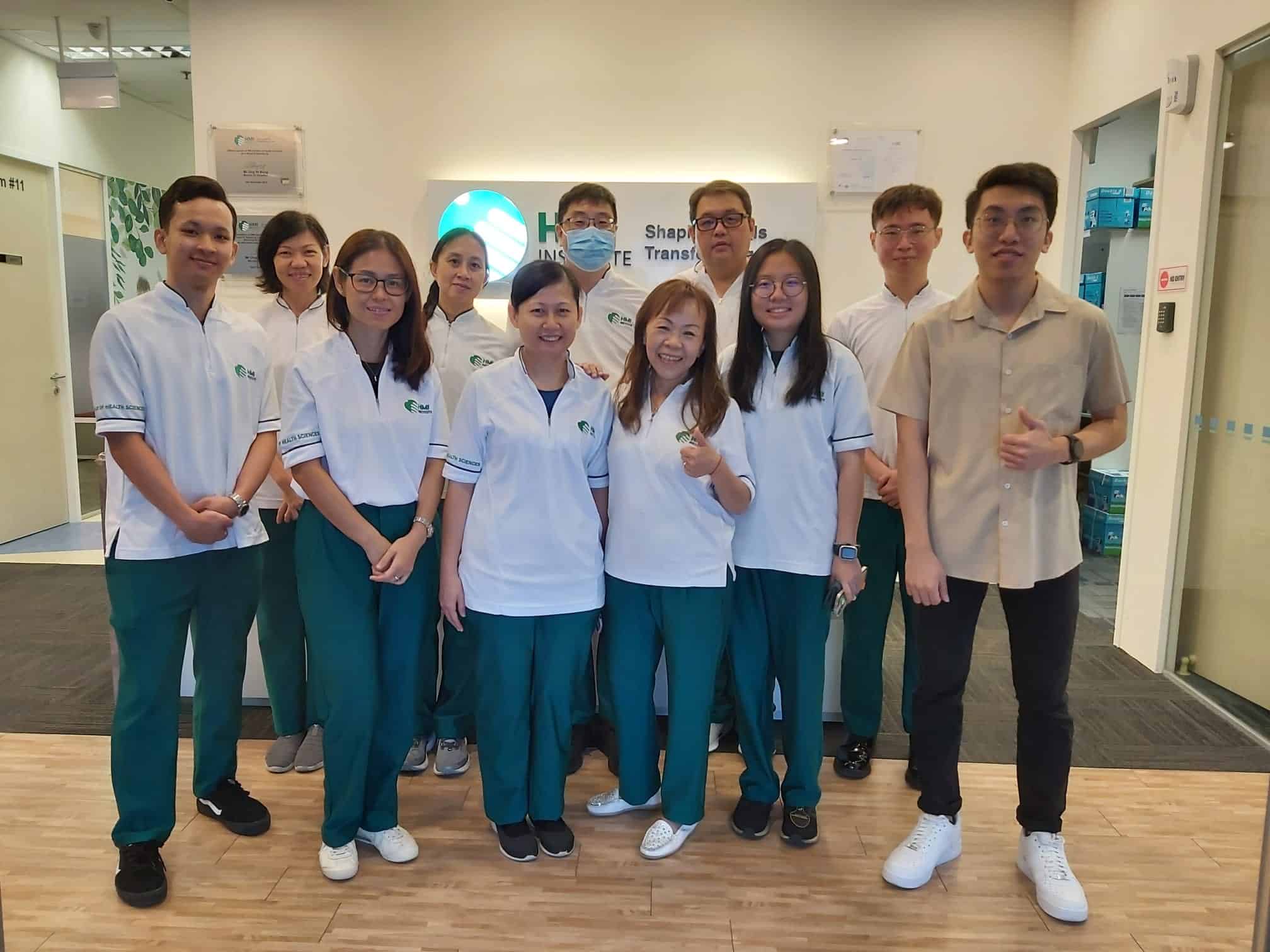The Career Conversion Programme (CCP) for Enrolled Nurses allows Trainees to pursue their 2-year or 3-year Higher Nitec in Nursing at ITE College East (Simei) and graduate as Enrolled Nurses. Training fees are fully sponsored, training allowances are given monthly to support their studies, and a one-time career transition bonus is given upon course completion.
How did you learn about the CCP? In April 2023, while working in the Transitional Care Facility (TCF) as a safety and security manager (SSM), I decided to progress further in healthcare. When I did my research, this is where I found out about the CCP. The application period for the 2024 intake hasn’t opened, and a few days before the application opened (10 May 2023), the application page was updated from the 2-year Nitec course to the 3-year (January intake) and 2-year (April intake) Higher Nitec.
What are the requirements for applying to CCP? The minimum would be Employability Skills (ES) Workforce Skills: Workplace Literacy and Numeracy (WPLN) Level 5 for Reading, Listening, Writing, Speaking, and Numeracy if you do not have 3 GCE ‘N’ Level Passes (Grade A-D or Grade 1-5) in English Language, Mathematics and one other subject to enter the 3-year Higher Nitec in Nursing course. As a secondary three dropout, I took the WPLN route the same month and was fortunate to get the desired results.
How does WPLN work? To summarise, it is a system to assess your proficiency in English and numeracy. It is similar to the International English Language Testing System (IELTS) but is easier and in a local context. The grading ranges from band level of 1 (lowest) to 8 (highest). Some Workforce Skills Qualifications (WSQ) courses require a certain level if you do not have a GCE N-level, and some employers also accept it as a qualification to apply for the job.
To take the assessment, you must book the assessment online at British Council Singapore, which costs $12 per component (after subsidy for Singapore Citizens/Permanent Residents). The total would be $60 for five components (Reading, Listening, Writing, Speaking, and Numeracy). Singapore Citizens aged 40 and above will receive additional funding support of $8 per component. This means you will only have to pay $4 per component, totalling $20. Do note that there is a 90-day lockdown to be eligible for the subsidy. If the result doesn’t meet your expectations and you decide to retake it within 90 days, you must pay the full fee before the subsidy, which is $40 per component. Be prepared and do well on your assessment so you do not have to rebook, as the booking has to be made at least one week before the assessment date. On the actual assessment day, you will go to a computer lab as the assessment is done using a computer.
What made you decide to apply for CCP? Honestly, nursing wasn’t my choice because of the work experience that I have encountered. One day, I was inspired by a compassionate nurse who performed the duty of care, which gave me determination. After some thought, I decided to change my mindset and give my full commitment. It allows me to become an Enrolled Nurse, where there are more things to learn and apply, whereas, as a healthcare assistant (HCA), there is a limit to what I can apply the things that I have learned. Even if I knew there would be some procedures, I could not perform. I want to use my potential fully.
What did you do while waiting for the outcome of the CCP application? Before applying to CCP in the same month (May), I enrolled on the SkillsFuture Career Transition Programme (SCTP) WSQ Higher Certificate in Healthcare (Therapy Support) full-time programme and got in. For the next four months, I was studying and working simultaneously. One week after completing the programme, I was fortunate to have the opportunity to return to my previous workplace (TCF) and work as a healthcare assistant (HCA) from September to December 2023 for three months while waiting for school to start.
Why did you take the therapy course when you decided to go for nursing? I thought it would be interesting to learn something different. Then, my thinking was: if I could get the sponsorship, I believe public education would teach better since I would study for years and not months. I could still work as a therapy assistant (TA) if I didn’t get the sponsorship. The benefits regarding working hours and salary are better for TAs than HCAs.
I am curious: What’s a TCF? Think of it as a temporary holding place with the concept of a nursing home where residents (patients) are awaiting discharge or placement to a nursing home.
Will my age affect the outcome of my application? This is one of the questions that I am often asked. Based on my observations, I think it does, but not to a great extent. I have seen other CCP Trainees from classes close to their 60s, and I am 25. I have classmates who are the same age as me and older than me (in their 30s and 40s).
Do I need sureties (guarantors) to apply? A surety is the only option unless you have capital and can provide a banker guarantee. One of your surety must be a Singapore Citizen, and the other can be a Permanent Resident. They can be your friends (which is my case). If you do not fulfil the bond, you must pay for the liquidated damages (LD) set by the CCP Sponsorship Agreement, and if you can’t, your sureties have to pay.
Do you recommend applying for CCP? The first question that comes to your mind should be: Is nursing something you want to do, and are you fully determined? Nursing isn’t easy because you care for someone not related to you and must have a high tolerance. Are you able to assist clients (patients) whenever they need help? Are you willing to get scolded for nothing? If you cannot handle it, and as time passes by, you will end up comprising the duty of care, and if your priority is to make money, then I would not recommend you because it isn’t the niche.
Other considerations would be:
1. If you have someone to care for, are you able to juggle studies at the same time? Because you do not want to fail, which could affect your performance in the long run.
2. Are you financially stable throughout your studies? Because you are not allowed to earn income, you are only given training allowances and a one-time career transition bonus.
3. Are you able to interact with all sorts of people? You will be studying with adolescents aged 17 years and above and mature students who may be older than you.
My Application Timeline
| 10 May 2023 | Applied for CCP for Enrolled Nurses Application (WSG portal) |
|---|---|
| 16 Jul 2023 | Submission of Documents (Email) |
| 24 Jul 2023 | Information and Enquiry Session (Zoom) |
| 2 Aug 2023 | Virtual Panel Interview (Zoom) |
| 4 Aug 2023 | Ranking of choices (Email) |
| 19 Sep 2023 | Interview Outcome (Email) |
| 11 Oct 2023 | Letter of Offer & Letter of Acceptance (Email) |
| 6 Nov 2023 | ITE Biodata Submission (Email) |
| 7 Nov 2023 | Medical Checkup (Sponsoring Organisation) |
| 8 Nov 2023 | Preparation and Submission of Documents by Trainees and Both Sureties (Email) |
| 17 Nov 2023 | Virtual Briefing for Signing of Sponsorship Agreement (Zoom) |
| 24 Nov 2023 | Online Verification Session (Zoom) |
| 18 Dec 2023 | CCP Sponsorship Agreement submission (Office) |
| 8 Jan 2024 | School Reporting (Email) |
As you can see, the timeline and processes are long, so good planning will be necessary to use your time wisely. Think carefully before deciding, as you will be bonded, and research the organisation you are interested in. Although they are under the same government bodies, every place has a different work culture. Don’t choose an organisation because it’s nearer to you as you do not want to regret it later.
How many sponsoring organisations can I choose from? You will be given a list of Public Healthcare Institutions (PHI), such as acute restructured general and community hospitals. Community Care Institutions include hospitals, nursing homes, and NKF (National Kidney Foundation). You may select your three preferred choices, one of which must be from the Community Care Institution. You will also be given the option to be randomly allocated to an institution if you do not get any of your three preferred choices.
Which sponsoring organisation should I choose? Generally, if you want to learn the most, I recommend selecting an acute restructured general hospital or, at least, a community hospital. If you cannot handle stress, a nursing home would be a better option as it is not fast-paced compared to the hospitals.
CCP-EN or CCP-RN (Diploma)? If you meet the requirements and can take the load, I advise you to go for CCP-RN. However, note that you will be studying for two years instead of the original three years, which means everything will be cramped, and your learning pace has to be faster. You must also pay for the bond should you fail your probation period. As for CCP-EN, I would recommend it if you prefer to have guidance, be more hands-on, and spend more time with your patient (coming from a sister 😂 when I did my site visit). Nevertheless, theory is still essential and comes together as a package.
Do you have any tips for the interview? Be truthful; keep it short and straightforward. I didn’t do well in my interview, but I still managed to get accepted. If you have applied, I wish you all the best in the outcome 💪
You may view my next post, where I will share more about my Life as a Higher Nitec in Nursing Student.








